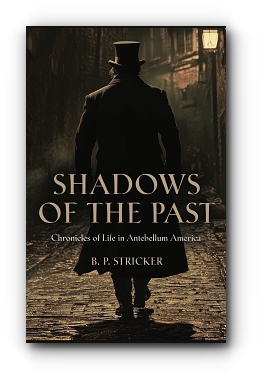| ||||||||||||||||
| Category: History:United States:Antebellum Era |
(requires Adobe Reader)
|
| About the Book | |
|
Antebellum history often focuses on the national and state circumstances facing the American people at the time. From the end of the War of 1812 until the beginning of the Civil War, America was struggling to find common ground on numerous problems dividing the country. Ultimately, the government failed to prevent the outbreak of civil war. But behind the scenes, during all the decades of political maneuvering, ordinary citizens throughout the country were still living their lives. People worked, married, had families, and interacted daily. “Shadows of the Past” is about those people. Through fifteen intriguing chapters, “Shadows of the Past” offers a unique look into how lesser-known changes, events, and social interactions in cities and towns across the country affected the lives of ordinary citizens. A few descriptive incidents will better illustrate the approach of “Shadows of the Past.” Steam power revolutionized how Americans traveled and shipped commodities. The new technology was an extreme benefit to the individual, the economy, and the country as a whole. But the steamboat also had its complications. This new form of energy had not wholly been mastered, and if crews were not adequately trained to operate the dangerous equipment, malfunctions could easily occur. This is precisely what happened to the ‘Lexington’ and ‘Princess’ steamboats. The experience of the calamity for the people on the boats and those who witnessed the events is extraordinary. Personal honor was a complex set of mores in Antebellum America. When a "man of honor" was dishonored by another, the result was often violent retribution. It could be a duel, legal in some regions but not others, or spontaneous violent retaliation. The latter occurred in 1859 when two political newcomers in Washington, D. C., settled a problem involving one of their wives. An arrest and trial in the case offered a unique legal defense that had never been successfully attempted in America. The Mormons struggled in Antebellum America to establish their religion. Incidents across the country forced them to move further and further West. But, even then, they found no peace. Constant harassment caused them to develop a more offensive position than they preferred. When an emigrant wagon train heading to California in 1857 attempted to cross the Utah Territory in an area known as Mountain Meadows, the encounter they had with the Mormons changed their lives and the course of Mormon history. Freemasonry in the United States has a long and ancient history. It began in America in colonial times and grew to such an extent that its power and influence in the country was without reproach. However, in 1826, in New York, when an offended Freemason who threatened to reveal the fraternity’s secrets disappeared without a trace, the public began to develop a less friendly attitude toward the secret society. The investigation into the missing man’s disappearance and what was believed to be murder changed the view of the public toward the Freemasons in America. The theater was one of the most popular pastimes during the Antebellum Period. It was one of the rare venues where all social classes intermingled, much to the chagrin of the upper class, whose public etiquette differed significantly from the rabble of the working class. Patrons were also passionate about specific actors and tended to extend their loyalty to those who fit their social class. When an actor from England insulted the working-class followers of an American actor, nationalism overflowed into a violent confrontation in 1849 at the Astor Place Opera House. The approach of “Shadows of the Past” to historical events and incidents in Antebellum America will captivate the reader and inspire them to reassess the history of the common citizen in the Antebellum Era.
|
|
| About the Author | |
 |
B. P. Stricker holds Master's degrees in Criminal Justice from Xavier University and in American History from American Public University. He has a passionate interest in the chaotic and tumultuous period of Antebellum America. Originally from Ohio, he currently lives in Florida with his wife, Keri, and their dog, Max. |

